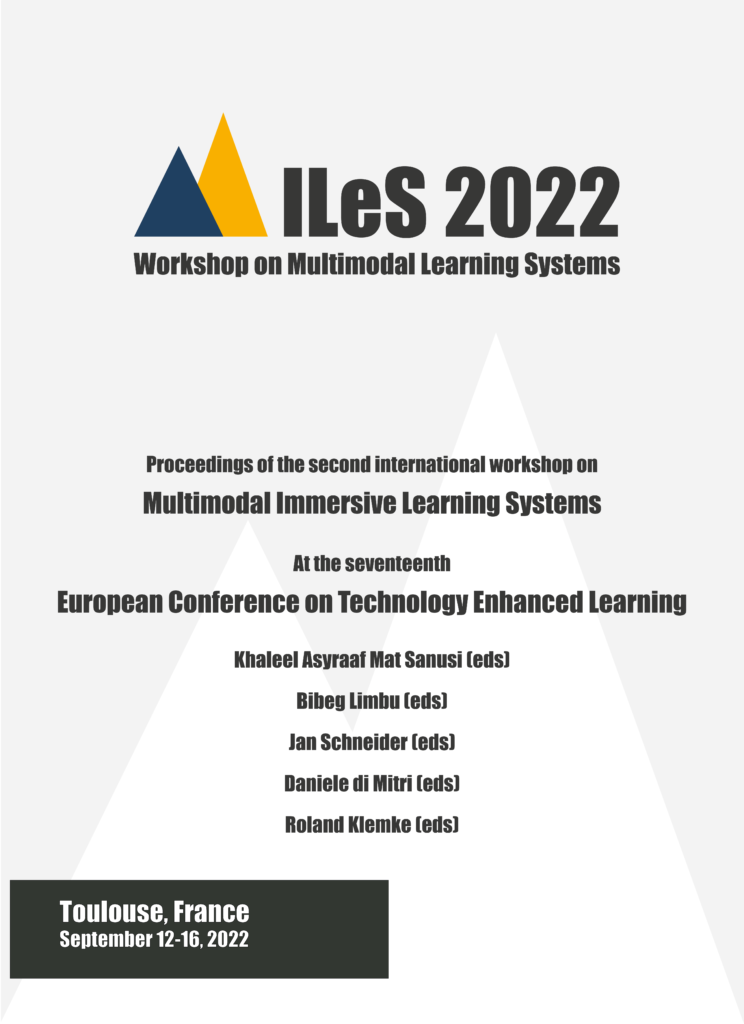MILeS 2022 – Multimodal Immersive Learning Systems
Second International Workshop
All the accepted contributions were published in the CEUR Proceedings – https://ceur-ws.org/Vol-3247/

Description
Advances in the related fields of wearable sensors, augmented reality, artificial intelligence, and machine learning make it possible to connect these technologies into integrated learning solutions. The intersection of these fields of emerging technologies is an area of a lot of opportunities for innovative learning systems, but likewise a field of fuzzy expectations. With the second edition of this workshop, we want to contribute to the systematic organisation of the field and to the advancement of solutions.
The MILeS 2022 workshop is organised in the context of the German BMBF-funded research project MILKI-PSY, which aims to develop AI-supported, data-intensive, multimodal, immersive learning environments for the independent learning of psychomotor skills. This leads to a cross-domain approach that makes it possible to record the activities of experts in a multimodal manner and to use these recordings as blueprints for learners. With the help of AI-based analysis, learning progress is to be supported by automated error detection and automatically generated, individual feedback. This creates holistic, innovative environments for cultivating psychomotor skills, in which personalised AI support enables individual learning processes based on complex data analysis.
With the interdisciplinary workshop, we aim to bring together experts and practitioners from technology-enhanced learning and educational application of technologies to collect ideas, requirements, best practices, example cases in the intersection of Artificial Intelligence, Multimodal Systems, Immersive Systems and their application into actual education.
Topics
- Technologies for multimodal immersive learning systems
- Mobile, wearable, and pervasive technologies
- Sensors, sensor networks, and Internet of Things
- Augmented reality, virtual reality, and mixed reality
- Artificial intelligence
- User experience in multimodal immersive learning systems
- Pedagogical concepts for multimodal immersive learning systems
- User acceptance of multimodal immersive learning systems
- Application fields for multimodal immersive learning systems
- Psychomotor skill training
- Human-robot interaction
- Simulations and immersive learning games
- Evaluation approaches for multimodal immersive learning systems
| Time | Agenda |
|---|---|
| 09:00 – 09:10 | Introductory session |
| 09:10 – 09:25 | Pitch session 1 1. Bibeg Limbu, Gitte Van Helden, Jan Schneider and Marcus Specht. We can teach more than we can tell: combining Deliberate Practice, Embodied Cognition, and Multimodal Learning. 2. Fernando Pedro Cardenas Hernandez and Jan Schneider. Considerations in Feedback and Periodization for the Multimodal Learning Experience of Running via Wearable Devices 3. Tobias Keller, Daniel Majonica, Roland Klemke and Anja Richert. Prerequisite Knowledge of Learning Environments in Human-Robot Collaboration for dyadic teams |
| 09:25 – 10:05 | Discussion round 1 |
| 10:05 – 10:20 | Pitch session 2 4. Michal Slupczynski and Ralf Klamma. MLOps-based Multimodal Sensor Stream Processing Pipeline for Learning Analytics in Psychomotor Education 5. Benjamin Paaßen, Tobias Baumgartner, Mai Geisen, Nina Riedl and Milos Kravcik. Few-shot keypose detection for learning of psychomotor skills 6. Gianluca Romano. Meaningful Feedback from Wearable Sensor Data to Train Psychomotor Skills |
| 10:20 – 10:30 | Discussion round 2 (part 1) |
| 10:30 – 11:00 | Coffee break |
| 11:00 – 11:30 | Discussion round 2 (part 2) |
| 11:30 – 11:45 | Pitch session 3 7. Daniele Di Mitri, Sebastian Gombert and Onur Karademir. Reflecting on the Actionable Components of a Model for Augmented Feedback 8. Mai Geisen, Khaleel Asyraaf Mat Sanusi, Tobias Baumgartner and Stefanie Klatt. XR golf putt trainer: User opinions on an innovative real-time feedback tool 9. Khaleel Asyraaf Mat Sanusi, Michal Slupczynski, Mai Geisen, Deniz Iren, Ralf Klamma, Stefanie Klatt and Roland Klemke. IMPECT-Sports: Using an immersive learning system to facilitate the psychomotor skills acquisition process. |
| 11:45 – 12:25 | Discussion round 3 |
| 12:25 – 12:30 | Closing |
Programme Committee and Organisers
- Roland Klemke, TH Köln and Open Universiteit Nederland
- Khaleel Asyraaf Mat Sanusi, TH Köln
- Daniel Majonica, TH Köln
- Anja Richert, TH Köln
- Valerie Varney, TH Köln
- Tobias Keller, TH Köln
- Bibeg Limbu, TU Delft
- Jan Schneider, DIPF
- Daniele Di Mitri, DIPF
- George-Petru Ciordas-Hertel, DIPF
- Fernando P. Cardenas-Hernandez, DIPF
- Gianluca Romano, DIPF
- Miloš Kravčík, DFKI
- Benjamin Paaßen, DFKI
- Ralf Klamma, RWTH
- Michal Slupczynski, RWTH
- Stefanie Klatt, Deutsche Sporthochschule
- Mai Geisen, Deutsche Sporthochschule
- Tobias Baumgartner, Deutsche Sporthochschule
- Nina Riedl, Deutsche Sporthochschule